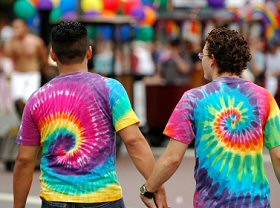 Being a victim of sexual assault and seeking help is difficult for anyone, but when the victim is gay the thought of reporting a crime is laced with uncertainty and mistrust, according to new research from the University of Oregon.
Being a victim of sexual assault and seeking help is difficult for anyone, but when the victim is gay the thought of reporting a crime is laced with uncertainty and mistrust, according to new research from the University of Oregon. The study found that 94 percent of lesbian, gay, bisexual, transgender and/or queer (LGBTQ) respondents believe sexual violence is a problem. Eighty-seven percent of the respondents also said that that sexual violence prevention tailored to the LGBTQ community is needed, and more than 60 percent felt that existing local agencies and law enforcement were ill-equipped to deal with cases.
"The take-home message was that sexual violence is real and complicated for members of the LGBTQ community," said study author Jeffrey L. Todahl. "There are additional barriers because of discrimination. It is hard enough to reach out to ask for help if you are sexually assaulted. This is compounded when you have to wonder if people in law enforcement, at a hospital or with an agency will think poorly of you because of your sexual orientation. A victim will ask, 'Will I be judged, and is your organization safe? If I can't trust you, I cannot get the help I need.'"
The study, drawn from a convenience sample rather than a random one, was part of a larger project funded by the Oregon Attorney General's Sexual Assault Task Force. Interestingly, several focus group members noted that society in general - and even LGBTQ members - dismiss even the possibility that sexual violence occurs in the LGBTQ community.
But when a sexual assault does occur, Todahl said, members of the LGBTQ community continue to be cloaked in fear of judgment. "LGBTQ persons live in an inherently dangerous environment and reasonably assume that they may be targeted, mistreated and blamed - even by service providers, law enforcement and health-care professionals. [Victims] have to start with the assumption that I don't trust you," he added. "They don't feel safe and worry that they will be quickly judged."
Sexual assault must be more clearly defined socially and must carry real consequences, Todahl believes. "The general community needs to be more welcoming of people's sexual orientation," he stressed. Participants also suggested that workers at agencies, from police to health care to social service agencies, be trained to better understand sexual assault and what it means to be a member of a sexual minority.
Related:
Gay Communities In Decline
The Nurture And Nature Of Homophobia
Victimization Chief Factor Behind Gay Suicides
Source: University of Oregon

